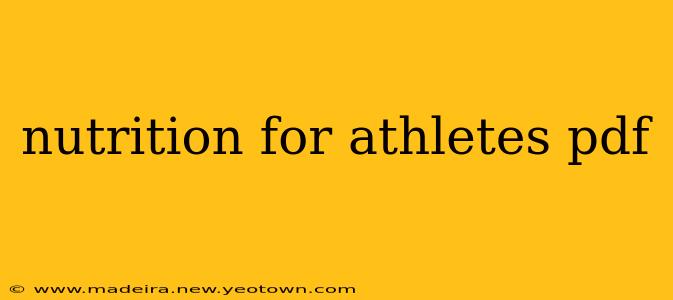For athletes, the saying "you are what you eat" takes on a whole new meaning. Performance isn't just about training; it's intricately linked to the fuel you provide your body. This comprehensive guide delves into the world of athlete nutrition, offering practical advice and insights to help you optimize your performance and recovery. Forget generic diet plans; we'll explore a personalized approach to fuel your athletic journey.
What are the basic nutritional needs of athletes?
The foundation of any athlete's nutrition plan rests on a balanced intake of macronutrients: carbohydrates, proteins, and fats. Think of it like this: carbohydrates are your immediate energy source, fueling your workouts; proteins are the building blocks for muscle repair and growth; and fats provide sustained energy and support hormone production. The specific ratios of these macronutrients will vary depending on the intensity and duration of your training, your sport, and individual factors like body composition and metabolism. Consulting a registered dietitian or sports nutritionist is crucial for personalized guidance. They can help you determine the optimal macronutrient balance for your unique needs.
What are some common nutritional mistakes athletes make?
Many athletes, in their quest for peak performance, fall into common nutritional traps. One frequent mistake is neglecting the importance of consistent hydration. Dehydration can significantly impair performance, leading to fatigue, muscle cramps, and decreased endurance. Another pitfall is the misconception surrounding calorie restriction. While weight management is important for some athletes, severe calorie restriction can hinder performance, impair recovery, and even increase the risk of injury. Furthermore, many athletes fail to prioritize nutrient timing, neglecting to consume sufficient carbohydrates and protein before, during, and after training to maximize energy levels and muscle recovery. Finally, neglecting micronutrients, essential vitamins and minerals, is often overlooked, which plays a vital role in overall health and athletic performance.
What foods should athletes eat before, during, and after exercise?
Before Exercise: The pre-workout meal should focus on easily digestible carbohydrates to provide immediate energy. Examples include oatmeal, toast with banana, or a small energy bar. Avoid high-fat foods, as they can slow digestion.
During Exercise (for longer sessions): During prolonged training sessions (longer than 60-90 minutes), athletes need to replenish energy stores. Sports drinks or gels provide carbohydrates and electrolytes to maintain hydration and performance.
After Exercise: The post-workout meal is crucial for muscle recovery and replenishment of glycogen stores. A combination of carbohydrates and protein is ideal. Examples include a protein shake with fruit, Greek yogurt with berries, or a chicken salad sandwich.
How much protein should athletes consume?
Protein requirements for athletes are higher than those for sedentary individuals due to the increased demand for muscle repair and growth. However, the exact amount varies depending on factors such as training intensity, training volume, and individual body composition. While general recommendations exist, consulting a registered dietitian or sports nutritionist is recommended to determine the optimal protein intake for your specific needs and training regimen. They can help you determine the right amount based on your training demands, considering factors that influence protein requirements.
What are some supplements athletes may consider?
While a balanced diet should be the primary source of nutrients for athletes, certain supplements may be considered to address specific needs or deficiencies. However, it's crucial to consult with a healthcare professional or registered dietitian before taking any supplements. Many supplements are not regulated and may contain harmful substances. They can also interact with medications. Prioritizing whole foods should always be the foundation of an athlete’s nutrition plan. Supplements should only be considered after addressing nutritional needs through diet.
How can athletes manage their weight?
Weight management for athletes is a complex issue that requires a holistic approach. It's crucial to avoid extreme dieting or restrictive practices that can hinder performance and overall health. Instead, focus on a balanced diet that provides sufficient energy to fuel training while supporting optimal body composition. A registered dietitian or sports nutritionist can help develop a personalized weight management plan that takes into account the specific demands of your sport and individual needs. Remember, weight management should be guided by a healthcare professional who can ensure the process is safe and effective for your athletic performance.
This guide serves as a starting point for understanding the crucial role of nutrition in athletic performance. Remember that individualized plans are key. Consulting professionals will help you create a nutrition plan tailored to your specific needs, ensuring you’re optimally fueled for success.

